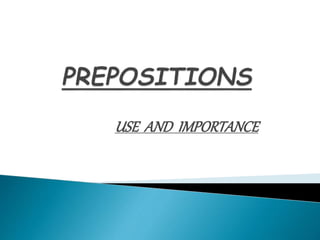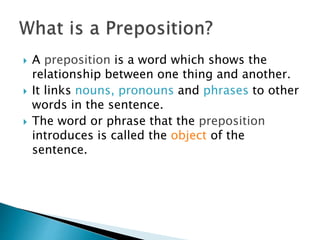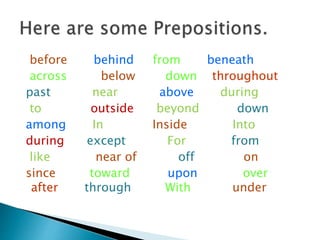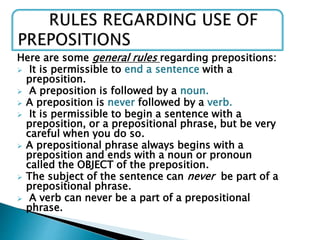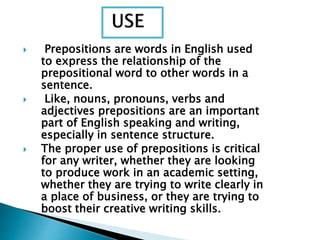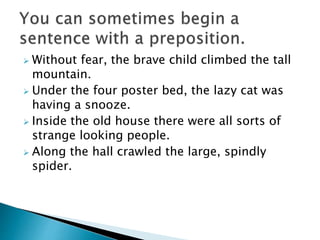English
- 2. ï― A preposition is a word which shows the relationship between one thing and another. ï― It links nouns, pronouns and phrases to other words in the sentence. ï― The word or phrase that the preposition introduces is called the object of the sentence.
- 3. before behind from beneath across below down throughout past near above during to outside beyond down among In Inside Into during except For from like near of off on since toward upon over after through With under
- 4. Here are some general rules regarding prepositions: ï It is permissible to end a sentence with a preposition. ï A preposition is followed by a noun. ï A preposition is never followed by a verb. ï It is permissible to begin a sentence with a preposition, or a prepositional phrase, but be very careful when you do so. ï A prepositional phrase always begins with a preposition and ends with a noun or pronoun called the OBJECT of the preposition. ï The subject of the sentence can never be part of a prepositional phrase. ï A verb can never be a part of a prepositional phrase.
- 5. ï― Prepositions are words in English used to express the relationship of the prepositional word to other words in a sentence. ï― Like, nouns, pronouns, verbs and adjectives prepositions are an important part of English speaking and writing, especially in sentence structure. ï― The proper use of prepositions is critical for any writer, whether they are looking to produce work in an academic setting, whether they are trying to write clearly in a place of business, or they are trying to boost their creative writing skills.
- 6. ïķ Here is an example with the preposition up. Correct usage: We ran up the hill. Incorrect: Up the hill we ran. Here is an example with the preposition over. ïķ Correct: The rabbit jumped over the log. incorrect: Over the log the rabbit jumped. ïķ Here is an example with the preposition aboard. Correct: We got aboard the train to ride down to San Diego. Incorrect: Aboard the train we got to ride down to San Diego.
- 7. ï Without fear, the brave child climbed the tall mountain. ï Under the four poster bed, the lazy cat was having a snooze. ï Inside the old house there were all sorts of strange looking people. ï Along the hall crawled the large, spindly spider.
- 8. ï― Prepositions are important because they work to connect various parts of a sentence. ï― Prepositions tell us where something is in relation to something else or how things are related in space âin, on, to, with, over, under, onto, into, beside or where so/sth is going (to church). ï― Others show physical connections or possession between nouns or pronouns and another word such as of, with, by. ï― Some refer to relationships in time: while, during, after, until, before, since.
